
http://www.iaeme.com/IJM/index.asp 69 editor@iaeme.com
International Journal of Management (IJM)
Volume 8, Issue 6, Nov–Dec 2017, pp. 69–75, Article ID: IJM_08_06_008
Available online at
http://www.iaeme.com/ijm/issues.asp?JType=IJM&VType=8&IType=6
Journal Impact Factor (2016): 8.1920 (Calculated by GISI) www.jifactor.com
ISSN Print: 0976-6502 and ISSN Online: 0976-6510
© IAEME Publication
THE EFFECT OF BIRTH ORDER IN THE
EMOTIONAL INTELLIGENCE OF NET
GENERATION STUDENTS
Abhishek Venkteshwar
Assistant Professor and Research Scholar-Jain University, Bangalore
Dr Uma Warrier
Professor and Chief Counselor-Jain University, Bangalore
ABSTRACT
Purpose: Research in the field of Emotional Intelligence have become a dynamic
study area over the past few decades and is likely to become even more so as the
importance of human resource management is rapidly gaining momentum. Therefore
understanding Emotional Intelligence will be viewed as increasingly important.
Research in the field of family type and birth are slowly gaining momentum.
Understanding birth order will be viewed as increasingly important. Birth order is
one of the most neglected component in the Indian education system due to the
complexity in its computation. Birth order shapes an individual’s personality,
measured by big 5 personality traits of an individual (Openness to experience,
Conscientiousness, Extraversion, Agreeableness and Neuroticism) and controls the
behavior of the person which has a strong relationship with the academic
performance. This article aims at examining the relationship between Emotional
Intelligence and birth order of net generation students.
Key words: Birth order, Emotional intelligence and Net generation students.
Cite this Article: Abhishek Venkteshwar and Dr Uma Warrier, The Effect of Birth
order in the Emotional Intelligence of Net Generation Students. International Journal
of Management, 8 (6), 2017, pp. 69–75.
http://www.iaeme.com/IJM/issues.asp?JType=IJM&VType=8&IType=6
1. INTRODUCTION
1.1. Emotional Intelligence
Daniel Goleman's Definition: “Emotional Intelligence refers to the capacity for recognizing
our own feelings and those of others, for motivating ourselves, and for managing emotions
well in ourselves and our relationships.”(Goleman 2004)Salovey and Mayer's Definition:
"Emotional Intelligence is the ability to perceive emotions, to access and generate emotions so
as to assist thought, to understand emotions and emotional knowledge, and to reflectively
regulate emotions so as to promote emotional and intellectual growth."(Salovey and Mayer

Abhishek Venkteshwar and Dr Uma Warrier
http://www.iaeme.com/IJM/index.asp 70 editor@iaeme.com
2007)Salovey, Brackett and Mayer (2007) state that “emotional intelligence (EI) refers to the
processes involved in the recognition, use, understanding and management of one‟s own and
other emotional states to solve emotion-laden problems and to regulate behavior (Salovey,
Brackett and Mayer 2007)
Emotional Intelligence (EQ or EI) is a term created by two researchers – Peter Salavoy
and John Mayer – and popularized by Dan Goleman in his 1996 book of the same name.
Emotional intelligence is the ability to identify and manage your own emotions and the
emotions of others.
There are 5 components of Emotional Intelligence (Goleman 2004), which has been
discussed below.
Self-awareness: It is all about understanding one‟s own self. This involves a lot of Self
analysis and understanding themselves and knowing how one‟s own reaction at different
situations.
Self-Regulation: This involves controlling the behavior of one‟s own self. It also focuses on
how a person should keep a tab on his or her emotions in public.
Motivation: Motivation is the driving force that makes a person behave in a certain manner.
Empathy: The ability to understand the emotions and feeling of others.
Social Skills: The ability to socialize and interact with others in the society
2. LITERATURE REVIEW
2.1. Studies on Emotional Intelligence
Berrocal, Cabello, Castillo & Extremera (2012) investigated the role of gender differences
in EI and whether age acted as a mediator in the relationship between gender and EI among
university students and adults in the community. They observed that age completely mediated
the relationship between gender and EI. Therefore, the role of age is more pronounced.
Bii, Lucas, Mwengi et al. (2012) investigated the relationship between age and EI of
managers and whether the relationship is moderated by gender and managerial experience in
educational institutions including primary, secondary and tertiary institutions. They observed
that age had a positive and significant influence on EI and moderating effects of gender and
managerial experience were mild and non-significant.
Kumar & Muniandy (2012) studied the EI of lecturers in a polytechnic in Malaysia and
examined the impact of demographic factors like age, gender, occupational grade, work
experience in the present as well as in the past job in industry. They concluded that age,
experience, occupational grade and education had a significant positive influence on EI but
gender and previous work experience had no impact on level of EI of lecturers.
O’Boyle Jr., et al. (2011) conducted meta-analysis of empirical research concerning
relation among EI, Five Factor Model (FFM), cognitive ability and job performance. The
study focused on identifying the association of three streams of EI (ability based models
adopting objective test items, self-report measures based on four-branch model of EI and
mixed models of emotional competencies) with FFM, cognitive ability and job performance.
The results confirmed a positive correlation (approximately same level) between EI measured
by three streams and job performance. EI and cognitive ability and four FFM were positively
associated and neuroticism (one of the FFM factors) was negatively associated with EI.
Gryn (2010) studied the relationship between EI traits of 268 call center leaders and their
job performance in a medical aid administration organization in Johannesburg, South Africa.

The Effect of Birth order in the Emotional Intelligence of Net Generation Students
http://www.iaeme.com/IJM/index.asp 71 editor@iaeme.com
The study found no significant association between overall EI and job performance of the call
center leaders.
Mishra & Mohapatra (2010) researched the relationship between EI and job
performance of 90 executives employed in different organizations in Delhi NCR. The results
found a significant positive relationship between EI and job performance. The study also
confirmed the concurrent validity of EI scale (EI test by Chadha and Singh, 2001). Also, out
of various demographic variables, only work experience was found to be positively correlated
with EI.
3. STUDIES ON EMOTIONAL INTELLIGENCE AND BIRTH ORDER
Vijay Viegas, Joslyn Henriques(2014) The study was conducted on a sample of 60
adolescents (that is adolescents in the age group of 12-21 years) from dual-parent homes. The
tools used for data collection comprised of the Schutte Emotional Intelligence Scale (SEIS),
and a Personal Data Sheet. The tools used for statistical analysis were t-test and ANOVA
(One Way Analysis of Variance). The findings of the study revealed that significant
differences exist in emotional intelligence with regard to birth order.
3.1. Conclusion Drawn From Literature
Inconclusive Research in determining the relationship between birth order and emotional
intelligence of the reviews state that birth order affects emotional intelligence, while some
review states that emotional intelligence is not affected by birth order
3.2. Research Gap
There is hardly any information between birth order and Emotional Intelligence of university
students in India.
This research aims at filling this gap by understanding how birth order impacts Emotional
Intelligence in Net generation students.
4. RESEARCH METHODOLOGY
4.1. Objectives of the Study
To examine the differences in Emotional Intelligence of Net Generation students across birth
order.
4.2. Hypothesis
H0= There is no significant difference in the emotional intelligence of net generation students
across birth order.
H1= There is a significant difference in the emotional intelligence of net generation students
across birthorder.
4.3. Sample Design
There are 10 Universities in Bangalore, which is a combination of Central/State and Private
Universities offering Bachelors of Business Administration and Bachelors of Commerce. For
the purpose of this study 3 Universities have been considered , which is Bangalore
University(State University), Christ University (Private University) and Jain University
(Private University).5 different colleges under these universities have been considered .
CMR college
Mount Carmel College

Abhishek Venkteshwar and Dr Uma Warrier
http://www.iaeme.com/IJM/index.asp 72 editor@iaeme.com
St Anne‟s College
Christ Institute of Management
Centre for Management Studies
252 students sample was drawn from the above mentioned colleges as they seemed to be a
perfect blend of both state and private university .The questionnaire was administered for
these students.
4.4. Inclusion Criteria
Undergraduate- Management and Commerce students of 5 different colleges.
Sample Profile
Table 1.1 Indicating the College of the respondents in percentage
College
Frequency
Percentage
Christ Institute of Management
48
19.04%
CMR College
39
15.57%
Mount Carmel College
48
19.04%
Centre for Management Studies
75
29.76%
St Anne‟s College
42
16.66%
Total
252
100%
Figure 1.1:Bar Graph indicating percentage of respondents based on the college
The table and chart show that there are 29.6% of students from CMS,19.04% of students
from Mount Carmel College and Christ institute of Management, 16.66% of students from St
Anne‟s college and 15.5.57% of students from CMR college have answered the Emotional
Intelligence questionnaire.
Table 1.2 Indicating the percentage of respondents based on gender
Gender
Frequency
Percentage
Male
109
43.25%
Female
143
56.75%
0.00%
5.00%
10.00%
15.00%
20.00%
25.00%
30.00%
35.00%
Christ
Institute of
Management
CMR College Mount Carmel
College
Centre for
Management
Studies
St Anne’s
College
Percentage

The Effect of Birth order in the Emotional Intelligence of Net Generation Students
http://www.iaeme.com/IJM/index.asp 73 editor@iaeme.com
Figure 1.2 Bar Graph indicating percentage of respondents based on gender
The table and chart show that 56.75% of female and 43.25% of male have answered the
Emotional Intelligence questionnaire.
Sampling Technique
Convenient sampling was used to administer the questionnaire for the sample.
4.5. Tool Adapted For Data Collection
The tool used for this study is “Warrier‟s EI Questionnaire”. It consists of 14 demographic
questions and 80 Emotional Intelligence Quotient Questions with 16 sub categories such as
Self awareness ,Self esteem /confidence, Self motivation, Self management, Optimism ,
Resilience, Tolerance to ambiguity/ Intuition, Empathy, Stress coping skills, Relationship
skills, Influencing others, Nurturing others, Networking skills, Values, Believes and Attitude,
Assertiveness and Conflict management skills.
The tool was developed to measure the Emotional intelligence of an individual.
The tools has been standardized and the cronbach‟s alpha for the tool was reported
at.89.The face validity for the tool has also been conducted on 20 counselors and M.Sc
Psychology students.
5. DATA ANALYSIS
An ANOVA test is conducted to compare Emotional intelligence across BIRTHORDER.
Table 1.3 Indicating ANOVA for testing the relationship between Birth order and Emotional
Intelligence
Sum of
Squares
df
Mean
Square
F
Sig.
Between Groups
1.014
3
.338
1.301
.275
Within Groups
64.393
248
.260
Total
65.407
251
5.1. Analysis
A one-way between subjects ANOVA is conducted to compare the Emotional intelligence
across the birth order. ANOVA indicated no significant differences p=0.287>.05 (in other
words the significance value is more than 0.05). across birth order.
0
10
20
30
40
50
60
Male Female
Percentage

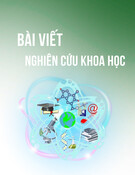

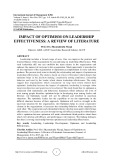
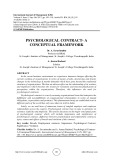
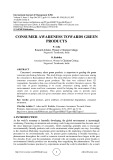
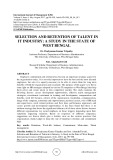

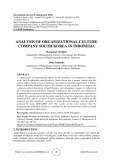
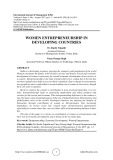
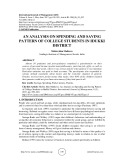






![Nội dung ôn tập Tâm lý học lứa tuổi học sinh trung học [chuẩn nhất]](https://cdn.tailieu.vn/images/document/thumbnail/2025/20251016/phuongnguyen2005/135x160/8151768537367.jpg)
![Đề cương học phần Tâm lý học nhân cách [chuẩn nhất]](https://cdn.tailieu.vn/images/document/thumbnail/2025/20251016/phuongnguyen2005/135x160/26911768537369.jpg)
![Đề cương ôn tập Tâm lý học đại cương [năm] chi tiết, chuẩn nhất](https://cdn.tailieu.vn/images/document/thumbnail/2025/20250115/sanhobien01/135x160/86881768473368.jpg)






